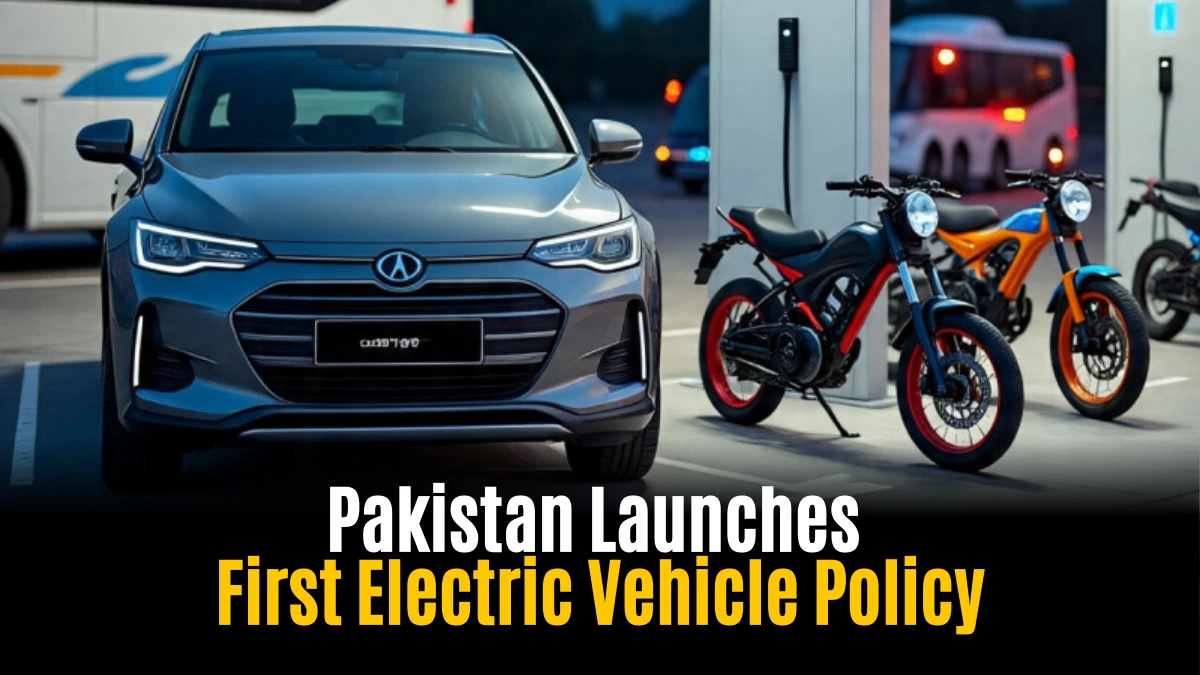Islamabad, August 26, 2025 – Prime Minister Shehbaz Sharif officially unveiled Pakistan’s First Electric Vehicle Policy, also known as the National Electric Vehicle (NEV) Policy 2025–30, marking a historic milestone in the country’s transition toward sustainable and eco-friendly transportation. This policy aims to reduce carbon emissions, decrease reliance on fossil fuels, and foster local electric vehicle (EV) manufacturing.
Key Highlights of the First Electric Vehicle Policy
Subsidies and Financial Incentives
Under the First Electric Vehicle Policy, the government has allocated over Rs100 billion ($353 million) in subsidies over five years to support the adoption of electric motorcycles and rickshaws. This initiative makes electric mobility accessible to the public, particularly in urban areas with high pollution.
Also Read:
CM Punjab Minority Card 2025: Empowering Communities, One Family at a Time
Expansion of Charging Infrastructure
The First Electric Vehicle Policy includes plans to establish 3,000 EV charging stations across Pakistan. This expansion is crucial for ensuring convenience and boosting consumer confidence in electric vehicles.
Youth Empowerment and Education
As part of the policy, 100,000 laptops will be distributed to high-performing students, with a 10% quota for students from Balochistan, promoting digital inclusion and empowering the youth to embrace new technology.
Environmental and Economic Benefits
The First Electric Vehicle Policy targets converting 30% of all vehicles to electric by 2030, which will:
- Save 2.07 billion liters of fuel annually (~$1 billion in foreign exchange).
- Reduce carbon emissions by 4.5 million tons.
- Cut healthcare-related costs by $405 million per year.
Industrial Growth and Job Creation
The policy encourages local manufacturing of electric vehicles, creating thousands of new jobs, reducing petroleum consumption, and establishing Pakistan as a leader in a “green industrial revolution.”
Source : Duniya news
Strategic Goals for the Future
- 2030: 30% of vehicle sales to be electric.
- 2040: 90% of vehicle sales to be electric.
- 2050: 100% electric vehicle sales.
- 2060: Complete transition to a zero-emission vehicle fleet.
International Collaboration
Prime Minister Shehbaz Sharif highlighted the support of international partners, including the UK, in shaping the First Electric Vehicle Policy, which aligns with global environmental standards.
Conclusion
The First Electric Vehicle Policy marks a historic step for Pakistan, promoting sustainable transportation through targeted subsidies, expanded infrastructure, and industrial growth. It empowers the youth, encourages local manufacturing, and supports social inclusion. This initiative aims to reduce carbon emissions, foster economic development, and create a greener, more sustainable future for the nation.
What is the First Electric Vehicle Policy launched by Prime Minister Shehbaz Sharif?
The First Electric Vehicle Policy (NEV Policy 2025–30) is Pakistan’s national framework to promote electric vehicles, reduce carbon emissions, and decrease fuel imports while boosting local EV manufacturing.
What incentives are offered under the First Electric Vehicle Policy?
The government has allocated Rs100 billion in subsidies for electric motorcycles and rickshaws, along with tax incentives to encourage local EV production and consumer adoption.
How will charging infrastructure be developed?
The policy includes the installation of 3,000 EV charging stations across Pakistan to support the growing number of electric vehicles and ensure consumer convenience.
What environmental benefits will the First Electric Vehicle Policy bring?
By 2030, the policy aims to convert 30% of all vehicles to electric, which will reduce carbon emissions by 4.5 million tons annually and save 2.07 billion liters of fuel.
How does the policy support youth and job creation?
Alongside EV adoption, the policy provides 100,000 laptops to students (with a 10% quota for Balochistan) and encourages local EV manufacturing, expected to create thousands of new jobs.



Join The Discussion